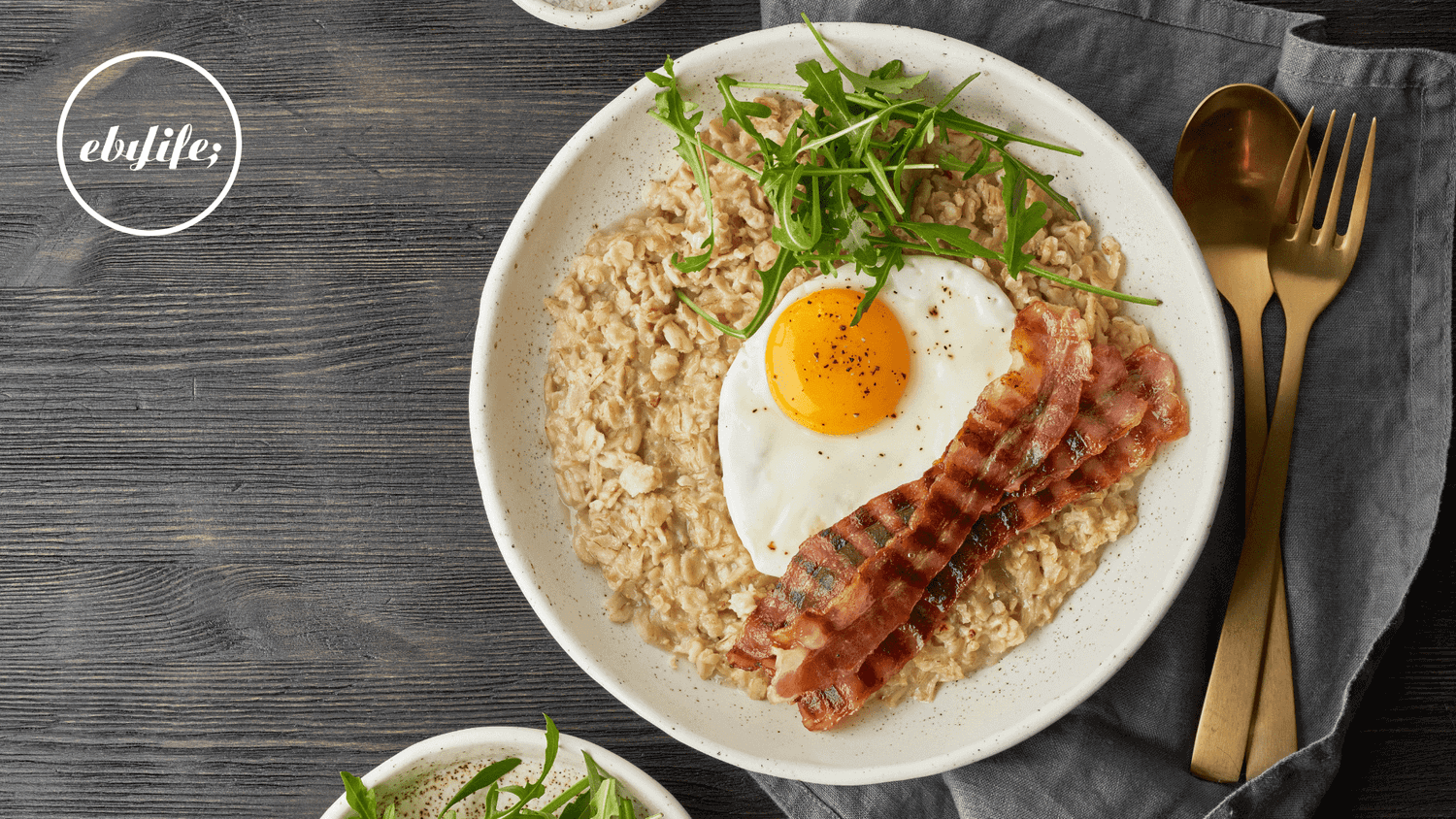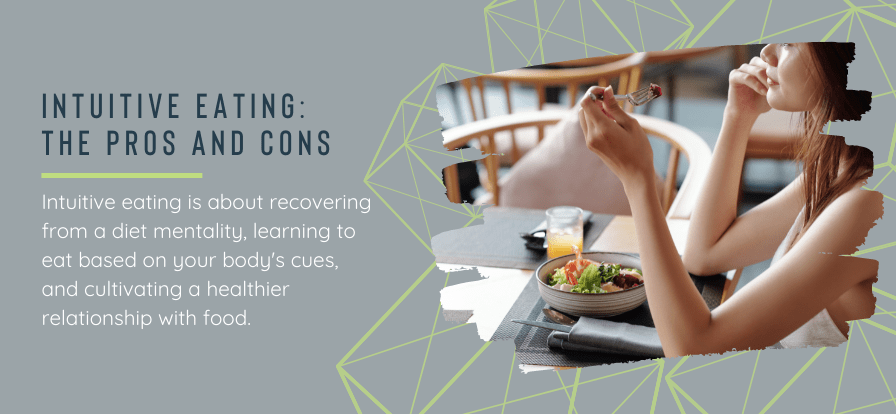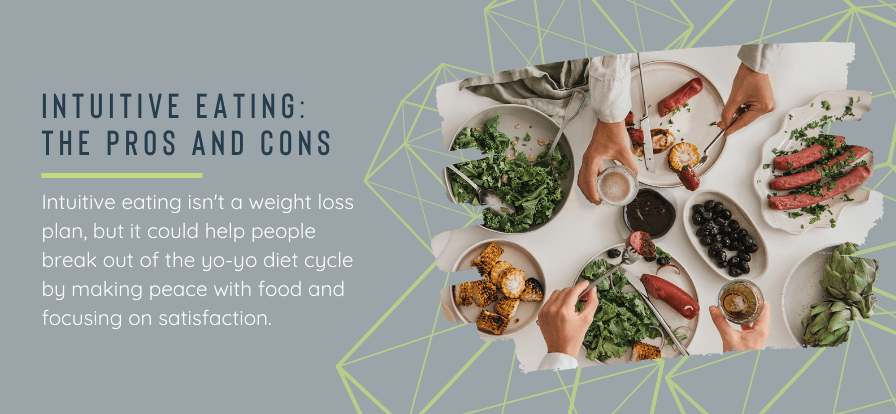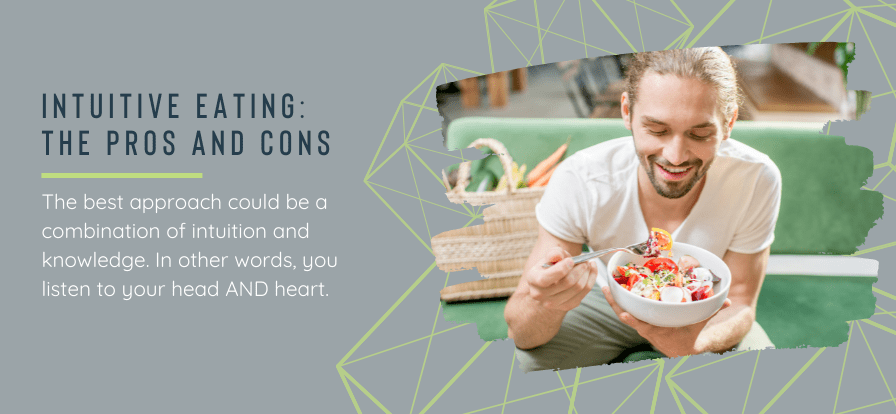Intuitive Eating: The Pros and Cons
Written by Stephanie Hodges, MS in Nutrition and Exercise Science, Edited by Martin Ebner, head Personal trainer and sports nutrition specialist at Ebylife.
Have you heard about intuitive eating? While intuition is a timeless concept applicable to all areas of life, two dietitians coined the term "intuitive eating" in the 1990s. They developed a framework to provide a new approach to eating that would help people find freedom from restrictive diet culture.
In this article, we're going to unpack the ten core principles of intuitive eating and weigh in on the pros and cons of this approach. While there's a lot to love, there are also a few cautions to consider. Let's dive in!
Where Did the Idea of Intuitive Eating Originate?
In 1995, dietitians Evelyn Tribole and Elyse Resch published the book Intuitive Eating: A Revolutionary Anti-Diet Approach. Intuitive Eating is now in its fourth edition, and the authors have also released a workbook and additional resources on this topic.
As practicing dieticians, they saw first-hand the adverse effects of dieting on their clients. People were yo-yo dieting and feeling miserable about themselves in the process. So they decided it was time for a new approach and created a framework that would provide a more holistic view of eating and health beyond weight loss.
Intuitive eating has recently gained renewed interest and momentum. As a result, bloggers, social media influencers, and health professionals frequently reference the concept and practice of intuitive eating. And there are mixed opinions out there!
What Are the 10 Principles of Intuitive Eating?
Essentially, intuitive eating is about recovering from a diet mentality, learning to eat based on your body's cues, and cultivating a healthier relationship with food. It's about making peace with your body, rejecting the idea of "good" and "bad" foods, and honoring your hunger.
Let's walk through the ten principles of intuitive eating.
The book, Intuitive Eating: A Revolutionary Anti-Diet Approach dedicates an entire chapter to each principle, so the list below is just skimming the surface of each topic.
Reject the diet mentality: Dieting is not sustainable or enjoyable; you must reject diet culture and its messaging.
Honor your hunger: Make sure you're eating enough throughout the day. Hunger is a healthy signal from your body, and skipping meals will make you more likely to overeat later.
Make peace with food: You don't have to feel guilty about the foods you eat; food doesn't have to be labeled "good" or "bad."
Challenge the food police: Don't listen to that voice in your head that's constantly judging what you're eating.
Discover the satisfaction factor: Find pleasure and satisfaction in the experience of eating.
Feel your fullness: Pay attention to your body's signals that you're getting full.
Cope with your emotions with kindness: Emotional eating is real, but food won't solve your problems. You need to deal with the roots and triggers of your feelings.
Respect your body: Accept your body and genetic blueprint.
Movement–feel the difference: Find an activity that you enjoy and energizes you. Listen to your body and what movement feels good rather than forcing exercise.
Honor your health with gentle nutrition: Make sure you get the nutrients your body needs but focus on progress over perfection.
Breaking Free From Diet Culture
Many people have an incessant preoccupation with food, weight, and dieting. After all, we're constantly bombarded with weight loss advice and pressured to conform to society's expectation of the "ideal" body type.
In 2021, the global weight management market was valued at $132.7 billion USD and projected to grow at a compound annual growth rate of 9.7% over the coming decade.
But we must ask ourselves if these diets and weight loss products are effective, especially considering that worldwide obesity has tripled since 1975.
As Tribole and Resch point out in their book, the diet industry has an impressive track record of failure. In fact, research shows that 95-98% of all dieters regain the weight they lost within one to five years. And through their unsuccessful weight-loss endeavors, dieters are frequently overwhelmed by feelings of failure, shame, and guilt.
So what's the alternative if diets are not helping people reach a healthy weight and are harming their self-esteem and mental health in the process?
Intuitive eating isn't a weight loss plan, but it could help people break out of the yo-yo diet cycle and transform their relationship with eating. This approach teaches you how to make peace with food and focus on satisfaction. It's a weight-neutral, non-diet approach that they claim to be more effective than dieting in the long run.
A meta-analysis on intuitive eating and its psychological correlates found that intuitive eating was inversely associated with
eating pathology
body image disturbances
psychopathology
In addition, intuitive eating was positively associated with positive psychological constructs such as
positive body image
self-esteem
wellbeing
While the promises of intuitive eating sound incredible, there are some critics of the method and some cautions to keep in mind.
Are There Downfalls to Intuitive Eating?
Intuition is a timeless concept that is defined as "a thing that one knows or considers likely from instinctive feeling rather than conscious reasoning."
We are born with innate intuition, but as we get older, we learn to override our intuition in favor of what we think we "should" do. The intuitive eating approach aims to help people reconnect with their inner knowing and learn to trust their own bodies and listen to their internal cues versus external measures.
While that sounds wonderful in principle, our eating behaviors are often complex, and it's easy to confuse intuition with cravings. Cravings are triggered by various things and aren't always a signal of what our body inherently wants or needs.
Some people rave about intuitive eating, while others have tried the approach and found it ineffective.
Some criticisms or downfalls of Intuitive Eating include:
A preoccupation with food and eating: Although intuitive eating strives to help you make peace with food, it has the opposite effect for some people, causing them to obsess about meals. Trying to read deeply into your body's signals can leave some people overanalyzing and overthinking their every bite.
The power of suggestion: Seeing food in your environment, on a billboard, or TV commercial can trigger a craving for the food when your body doesn't actually need it, and you wouldn't have otherwise felt the desire to eat it.
Eating isn't always intuitive: To follow up on the previous point, sometimes food isn't the best thing for your body, even when you desire to eat. Sometimes we want to eat for reasons other than hunger, such as boredom, stress, or habit. A craving or urge to eat is easy to confuse with intuition.
Some foods mess with your satiety and cravings: The food industry has put a lot of effort into engineering attractive and palatable foods. In other words, food loaded with salt, sugar, and additives that leave you always wanting more. Also, some foods cause your insulin levels to spike and crash, leaving you craving more.
You might need a different kind of help: If you have a history of disordered eating, it might be best to consult a professional before trying intuitive eating on your own. This is because old habits and thought patterns are deeply rooted, and you might need some guidance to help you address issues below the surface.
It's not a weight-loss plan: The goal of intuitive eating is to improve your relationship with food, not necessarily lose weight. However, many people believe that intuitive eating will lead to weight loss and are disappointed when the scale doesn't budge.
Eating for health: When it comes time for an afternoon snack, if you give people a choice between celery and raw broccoli or a pack of candy, most people will choose the candy. It's not always wrong to prioritize food for nutritional value or lower calorie content over taste and temporary satisfaction. Your body will be healthier in the long run and can learn to develop a taste for those foods over time.
The Bottom Line on Intuitive Eating
Intuitive eating is a great way to break free from ineffective diet culture. These principles can help you transform your relationship with food.
However, the best approach could be a combination of intuition and knowledge. In other words, you listen to your head and heart.
Listening to your body's cues is essential, but don't confuse innate intuition with your emotions and cravings. With a balanced approach, you can ditch restrictive diets for good and find true freedom in your food choices.
More articles you might enjoy:
References:
https://www.intuitiveeating.org
Weight Management Market Size, Share & Trends Analysis Report By Function. https://www.grandviewresearch.com/industry-analysis/weight-management-market
WHO Obesity and Overweight. https://www.who.int/news-room/fact-sheets/detail/obesity-and-overweight
Intuitive eating and its psychological correlates: A meta-analysis. https://onlinelibrary.wiley.com/doi/abs/10.1002/eat.23509




